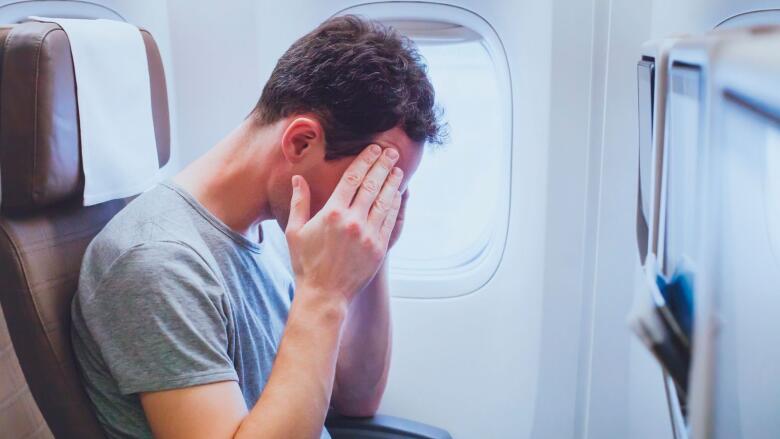Do you get anxious when flying? You’re not alone. In fact, about 1 in 6 people experience some level of fear when flying. This can be a major problem if you need to travel by plane for work or pleasure. But don’t worry – there are plenty of therapies that can help you overcome your fear of flying! In this blog post, we will discuss 7 different therapies that have been shown to be effective in helping people overcome their fear of flying.
Contents
Is The Fear Of Flying A Mental Illness?
 The fear of flying, or aviophobia, is a common phobia with a wide range of severity. While it’s not considered an official mental illness, it can have a major impact on someone’s life. For some people, the fear can be overwhelming and interfere with daily activities. It may cause extreme anxiety and panic attacks. For others, it may be a mild fear that only shows up in certain situations.
The fear of flying, or aviophobia, is a common phobia with a wide range of severity. While it’s not considered an official mental illness, it can have a major impact on someone’s life. For some people, the fear can be overwhelming and interfere with daily activities. It may cause extreme anxiety and panic attacks. For others, it may be a mild fear that only shows up in certain situations.
People who suffer from aviophobia often try to avoid flying altogether or require the help of sedative drugs to make it through a flight. Some people may even opt for longer travel times by taking a bus or car, just to avoid the plane. Despite these efforts, dealing with aviophobia can be a difficult process and may require professional help.
So, in many cases, this fear of flying is indeed a mental health issue that can have serious consequences. However, it is important to realize that it is not a mental illness in general. And most people with milder symptoms can learn to manage the anxiety on their own.
Can Therapy Help With The Fear Of Flying?
The short answer is yes! If you want to overcome your fear of flying, therapy can be a great option. It can provide an opportunity to work through underlying causes and gain skills and strategies to manage anxiety. Therapy can also help you figure out if there are any other related fears that may be contributing to the fear of flying, such as the fear of heights or enclosed spaces.
Several studies have found that fear of flying therapy is effective at reducing or eliminating fears. There are numerous approaches available, including cognitive behavioral therapy and exposure therapy. The benefits of therapy for fear of flying can be long-lasting, with gains maintained over time.
Therefore, in 90% of cases, fear of flying can be successfully managed with the appropriate guidance and support. A therapist who specializes in helping people overcome their fear of flying will develop a plan to meet your specific needs. And create an individualized treatment program that fits your situation.
What Are Some Fear Of Flying Therapy Options?
Fear of flying therapy options typically involves a combination of different types. Here are the top 7 fear of flying therapy options:
Cognitive Behavioral Therapy (CBT)
CBT is a type of psychotherapy that focuses on recognizing, understanding, and changing unhelpful thoughts and behaviors. With CBT, anxiety can be reduced by learning to respond more effectively to unwanted thoughts and feelings related to flying. The process of CBT involves self-monitoring and thought analysis, which can help to identify the negative beliefs about flying that are contributing to the fear.
For example, if you are afraid of flying because you think the plane is unsafe. Then CBT can help to assess the likelihood of an accident occurring. And, further, provide techniques for managing the fear.
Interpersonal Psychotherapy (IPT)
Another type of therapy that can be effective in treating the fear of flying is interpersonal psychotherapy. This therapy approach focuses on identifying patterns in relationships and communication with others that may be contributing to the fear. It begins with building a trusting relationship between the therapist and client, which can then provide a safe space to explore thoughts and feelings related to the fear of flying.
This can involve a range of different strategies, such as role-play and talking through difficult situations. In fact, role-play can be extremely beneficial in helping to manage a fear of flying by visualizing possible scenarios on the plane.
Exposure Therapy
Exposure therapy is a type of therapy designed to desensitize individuals to their fears by gradually exposing them to the source of their fear in a safe and controlled environment. For instance, a fear of flying might involve gradually increasing the level of exposure to airplanes. Such as walking around an airport or watching videos about flying.
The aim of this therapy is to eventually neutralize the fear response by showing that the feared situation does not result in any serious harm. This will more likely reduce the fear and anxiety associated with flying.
Hypnotherapy
Hypnosis is a form of therapy that reduces anxiety and can be used to help people overcome their fear of flying. It works by inducing a relaxed state in which the individual becomes more open to suggestions, allowing them to change thought patterns related to flying. Many people have reported success with hypnotherapy for fear of flying. So it can be a useful option to consider.
But, you must seek treatment from a qualified hypnotherapist in order to get the best results and ensure safety. Because this fear of flying therapy option can be a powerful tool, it is important that it is done correctly and with full trust in the therapist.
Virtual Reality Therapy (VRT)
VRT uses virtual reality technology to simulate a flight experience, allowing people to practice and become more comfortable with flying. The process starts with a guided visual tour of the virtual airplane, which can help to reduce anxiety about being on board. Then, there are various scenarios that involve different levels of difficulty, such as turbulence and plane noises.
This type of therapy can be highly effective for those who have a fear of flying because it puts them in a safe environment to practice and learn coping skills before getting onto an actual plane. It can also be tailored to fit the individual’s specific needs.
Imagery and Desensitization Therapy
This type of therapy involves visualizing yourself in a safe environment while you imagine being on an airplane. It helps people become more accustomed to the idea of being on a plane, reducing their fear of flying. For example, you might imagine yourself walking onto a plane and hearing the engines start up.
The therapist can help guide the individual through this process and provide techniques to help them cope with any emotions that arise. This type of therapy can be especially helpful for those who have difficulty facing their fear in real life.
Systematic Desensitization
 Finally, systematic desensitization is another form of therapy that can be used to help people with a fear of flying. This type of therapy involves gradually exposing the individual to different situations related to flying. Such as the thought of being on a plane or hearing announcements from a flight attendant.
Finally, systematic desensitization is another form of therapy that can be used to help people with a fear of flying. This type of therapy involves gradually exposing the individual to different situations related to flying. Such as the thought of being on a plane or hearing announcements from a flight attendant.
The aim of this approach is to gradually reduce the fear response and eventually bring it down to a manageable level. This technique can be combined with other therapies, such as exposure therapy, to help people become more comfortable with the idea of flying.
By exploring these fear-of-flying therapy options, you can find the best approach that works for you and start to feel more comfortable when boarding a plane. You may also consider speaking with mental health to gain further insight into your fears and how to manage them.
Do I Need Medicine To Manage My Fear Of Flying?
Generally, fear of flying therapy is considered the most effective way to manage a fear of flying. However, depending on the severity of the anxiety or phobia, your doctor may recommend medication as part of a treatment plan. Anxiety medications and antidepressants can be useful in controlling fear of flying symptoms, such as heart palpitations, sweating, or dizziness.
If your doctor does prescribe medication for you, it’s important to take it as directed and be aware of any potential side effects. Because there is still a lot that we don’t know about the long-term effects of anxiety medications. Thus, it’s important to discuss this with your doctor before beginning any treatment. In some cases, therapy may be used in conjunction with medication to help you better manage your fear of flying symptoms.
Conclusion
In conclusion, fear of flying therapy is often effective in helping people to overcome their fear of flying and to enjoy travel more. The techniques used in therapy are usually tailored to the individual. As no two people will experience the same anxiety symptoms or level of discomfort while traveling. While some may be able to manage their fears through self-help methods, many find that professional help is necessary for long-term success.
No matter how severe your fear may be, understand that help is available to you. With dedication and consistency, it is possible to face your fear of flying and enjoy travel.
For more information, please contact MantraCare. A phobia is a serious behavior that can cause physical, emotional, or psychological harm to a person. If you have any queries regarding Online Counseling experienced therapists at MantraCare can help: Book a trial Online therapy session


